反义疑问句练习题及答案讲解
- 格式:doc
- 大小:49.50 KB
- 文档页数:14
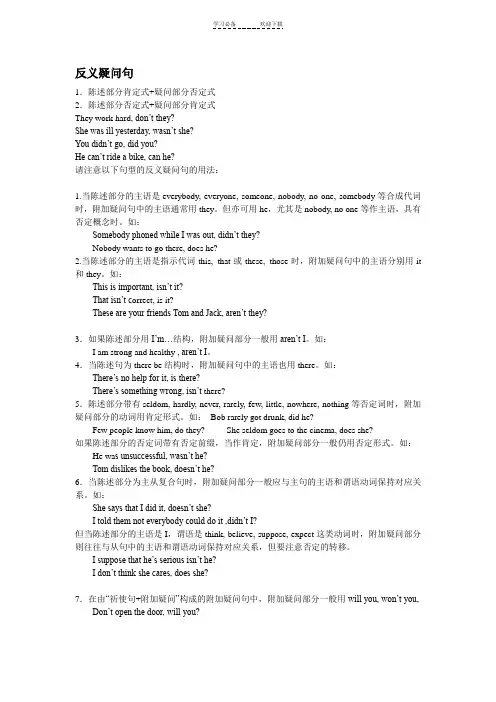
反义疑问句1.陈述部分肯定式+疑问部分否定式2.陈述部分否定式+疑问部分肯定式They work hard, don’t they?She was ill yesterday, wasn’t she?You didn’t go, did you?He can’t ride a bike, can he?请注意以下句型的反义疑问句的用法:1.当陈述部分的主语是everybody, everyone, someone, nobody, no one, somebody等合成代词时,附加疑问句中的主语通常用they。
但亦可用he,尤其是nobody, no one等作主语,具有否定概念时。
如:Somebody phoned while I was out, didn’t they?Nobody wants to go there, does he?2.当陈述部分的主语是指示代词this, that或these, those时,附加疑问句中的主语分别用it 和they。
如:This is important, isn’t it?That isn’t c orrect, is it?These are your friends Tom and Jack, aren’t they?3.如果陈述部分用I’m…结构,附加疑问部分一般用aren’t I。
如:I am strong and healthy , aren’t I。
4.当陈述句为there be结构时,附加疑问句中的主语也用there。
如:There’s no help for it, is there?There’s something wrong, isn’t there?5.陈述部分带有seldom, hardly, never, rarely, few, little, nowhere, nothing等否定词时,附加疑问部分的动词用肯定形式。
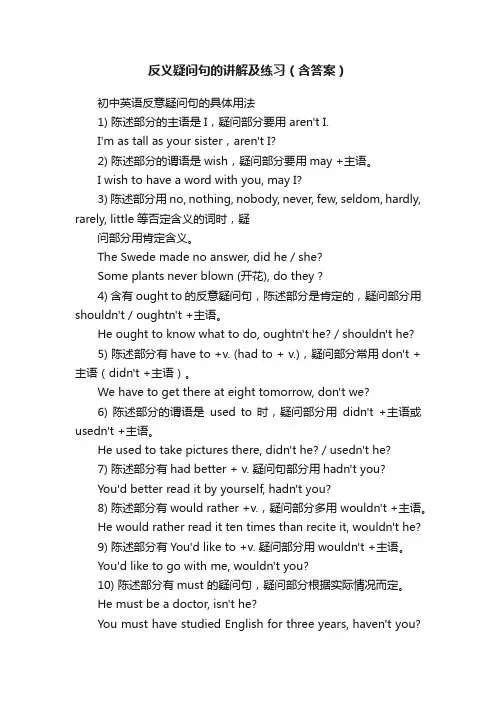
反义疑问句的讲解及练习(含答案)初中英语反意疑问句的具体用法1) 陈述部分的主语是I,疑问部分要用 aren't I.I'm as tall as your sister,aren't I?2) 陈述部分的谓语是wish,疑问部分要用may +主语。
I wish to have a word with you, may I?3) 陈述部分用 no, nothing, nobody, never, few, seldom, hardly, rarely, little等否定含义的词时,疑问部分用肯定含义。
The Swede made no answer, did he / she?Some plants never blown (开花), do they ?4) 含有ought to 的反意疑问句,陈述部分是肯定的,疑问部分用shouldn't / oughtn't +主语。
He ought to know what to do, oughtn't he? / shouldn't he?5) 陈述部分有have to +v. (had to + v.),疑问部分常用don't +主语(didn't +主语)。
We have to get there at eight tomorrow, don't we?6) 陈述部分的谓语是used to 时,疑问部分用didn't +主语或usedn't +主语。
He used to take pictures there, didn't he? / usedn't he?7) 陈述部分有had better + v. 疑问句部分用hadn't you?You'd better read it by yourself, hadn't you?8) 陈述部分有would rather +v.,疑问部分多用 wouldn't +主语。
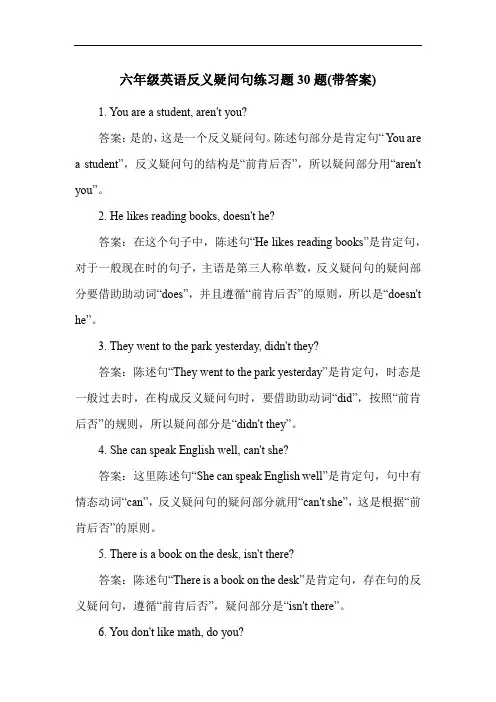
六年级英语反义疑问句练习题30题(带答案)1. You are a student, aren't you?答案:是的,这是一个反义疑问句。
陈述句部分是肯定句“ You are a student”,反义疑问句的结构是“前肯后否”,所以疑问部分用“aren't you”。
2. He likes reading books, doesn't he?答案:在这个句子中,陈述句“He likes reading books”是肯定句,对于一般现在时的句子,主语是第三人称单数,反义疑问句的疑问部分要借助助动词“does”,并且遵循“前肯后否”的原则,所以是“doesn't he”。
3. They went to the park yesterday, didn't they?答案:陈述句“They went to the park yesterday”是肯定句,时态是一般过去时,在构成反义疑问句时,要借助助动词“did”,按照“前肯后否”的规则,所以疑问部分是“didn't they”。
4. She can speak English well, can't she?答案:这里陈述句“She can speak English well”是肯定句,句中有情态动词“can”,反义疑问句的疑问部分就用“can't she”,这是根据“前肯后否”的原则。
5. There is a book on the desk, isn't there?答案:陈述句“There is a book on the desk”是肯定句,存在句的反义疑问句,遵循“前肯后否”,疑问部分是“isn't there”。
6. You don't like math, do you?答案:陈述句“You don't like math”是否定句,反义疑问句的结构是“前否后肯”,所以疑问部分是“do you”。
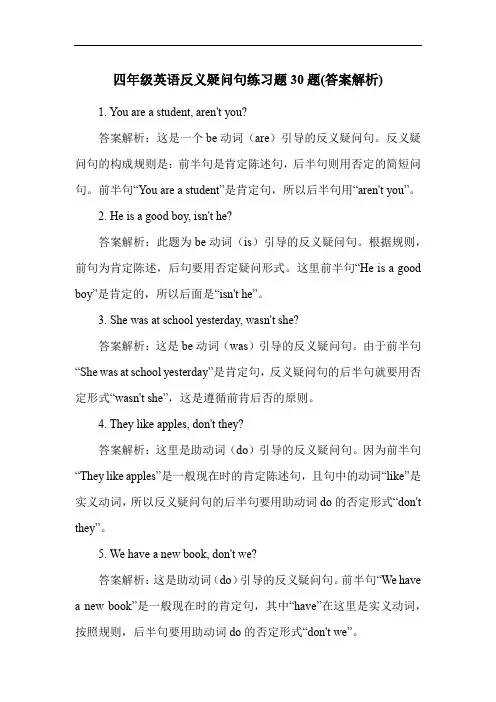
四年级英语反义疑问句练习题30题(答案解析)1. You are a student, aren't you?答案解析:这是一个be动词(are)引导的反义疑问句。
反义疑问句的构成规则是:前半句是肯定陈述句,后半句则用否定的简短问句。
前半句“You are a student”是肯定句,所以后半句用“aren't you”。
2. He is a good boy, isn't he?答案解析:此题为be动词(is)引导的反义疑问句。
根据规则,前句为肯定陈述,后句要用否定疑问形式。
这里前半句“He is a good boy”是肯定的,所以后面是“isn't he”。
3. She was at school yesterday, wasn't she?答案解析:这是be动词((was)引导的反义疑问句。
由于前半句“She was at school yesterday”是肯定句,反义疑问句的后半句就要用否定形式“wasn't she”,这是遵循前肯后否的原则。
4. They like apples, don't they?答案解析:这里是助动词((do)引导的反义疑问句。
因为前半句“They like apples”是一般现在时的肯定陈述句,且句中的动词“like”是实义动词,所以反义疑问句的后半句要用助动词do的否定形式“don't they”。
5. We have a new book, don't we?答案解析:这是助动词((do)引导的反义疑问句。
前半句“We have a new book”是一般现在时的肯定句,其中“have”在这里是实义动词,按照规则,后半句要用助动词do的否定形式“don't we”。
6. Tom can swim, can't he?答案解析:这是情态动词((can)引导的反义疑问句。
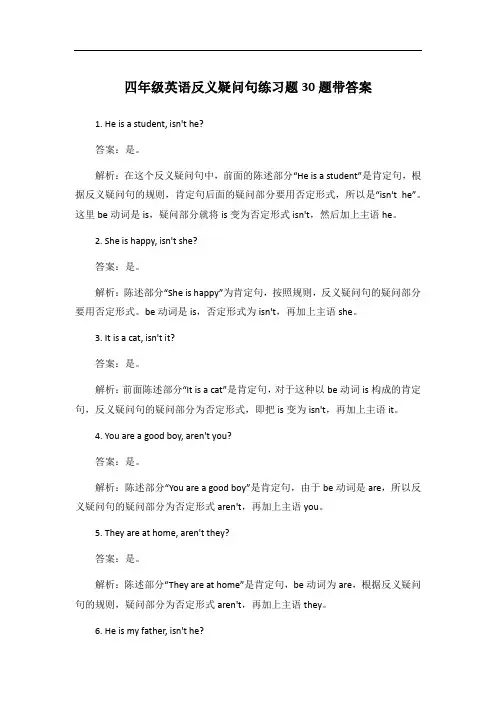
四年级英语反义疑问句练习题30题带答案1. He is a student, isn't he?答案:是。
解析:在这个反义疑问句中,前面的陈述部分“He is a student”是肯定句,根据反义疑问句的规则,肯定句后面的疑问部分要用否定形式,所以是“isn't he”。
这里be动词是is,疑问部分就将is变为否定形式isn't,然后加上主语he。
2. She is happy, isn't she?答案:是。
解析:陈述部分“She is happy”为肯定句,按照规则,反义疑问句的疑问部分要用否定形式。
be动词是is,否定形式为isn't,再加上主语she。
3. It is a cat, isn't it?答案:是。
解析:前面陈述部分“It is a cat”是肯定句,对于这种以be动词is构成的肯定句,反义疑问句的疑问部分为否定形式,即把is变为isn't,再加上主语it。
4. You are a good boy, aren't you?答案:是。
解析:陈述部分“You are a good boy”是肯定句,由于be动词是are,所以反义疑问句的疑问部分为否定形式aren't,再加上主语you。
5. They are at home, aren't they?答案:是。
解析:陈述部分“They are at home”是肯定句,be动词为are,根据反义疑问句的规则,疑问部分为否定形式aren't,再加上主语they。
6. He is my father, isn't he?答案:是。
解析:陈述部分“He is my father”为肯定句,be动词是is,反义疑问句的疑问部分为否定形式isn't,再加上主语he。
7. She is in the classroom, isn't she?答案:是。
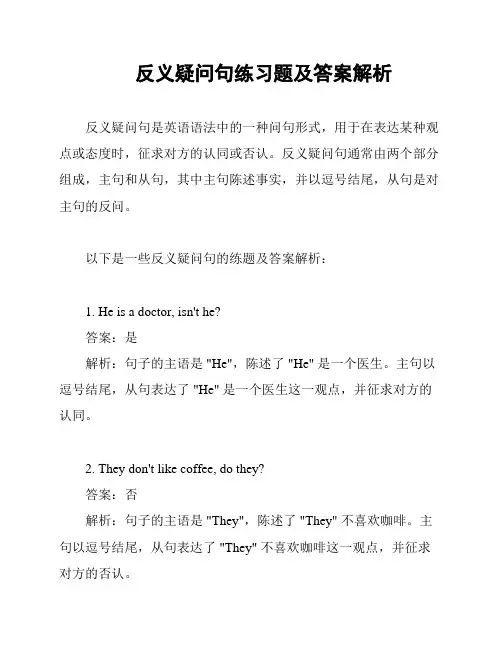
反义疑问句练习题及答案解析反义疑问句是英语语法中的一种问句形式,用于在表达某种观点或态度时,征求对方的认同或否认。
反义疑问句通常由两个部分组成,主句和从句,其中主句陈述事实,并以逗号结尾,从句是对主句的反问。
以下是一些反义疑问句的练题及答案解析:1. He is a doctor, isn't he?答案:是解析:句子的主语是 "He",陈述了 "He" 是一个医生。
主句以逗号结尾,从句表达了 "He" 是一个医生这一观点,并征求对方的认同。
2. They don't like coffee, do they?答案:否解析:句子的主语是 "They",陈述了 "They" 不喜欢咖啡。
主句以逗号结尾,从句表达了 "They" 不喜欢咖啡这一观点,并征求对方的否认。
3. You can swim, can't you?答案:是解析:句子的主语是 "You",陈述了 "You" 能游泳。
主句以逗号结尾,从句表达了 "You" 能游泳这一观点,并征求对方的认同。
4. She hasn't finished her homework, has she?答案:否解析:句子的主语是"She",陈述了"She" 没有完成她的作业。
主句以逗号结尾,从句表达了 "She" 没有完成她的作业这一观点,并征求对方的否认。
5. He won't be late, will he?答案:否解析:句子的主语是 "He",陈述了 "He" 不会迟到。
主句以逗号结尾,从句表达了"He" 不会迟到这一观点,并征求对方的否认。
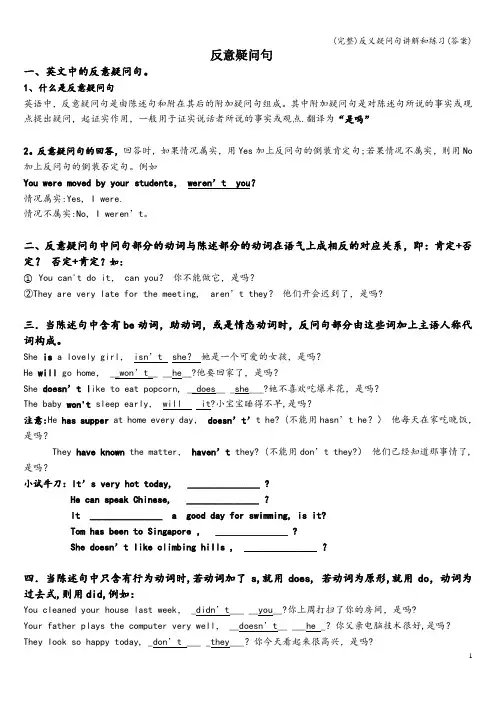
反意疑问句一、英文中的反意疑问句。
1、什么是反意疑问句英语中,反意疑问句是由陈述句和附在其后的附加疑问句组成。
其中附加疑问句是对陈述句所说的事实或观点提出疑问,起证实作用,一般用于证实说话者所说的事实或观点.翻译为“是吗”2。
反意疑问句的回答,回答时,如果情况属实,用Yes加上反问句的倒装肯定句;若果情况不属实,则用No 加上反问句的倒装否定句。
例如You were moved by your students,weren’t you?情况属实:Yes, I were.情况不属实:No, I weren’t。
二、反意疑问句中问句部分的动词与陈述部分的动词在语气上成相反的对应关系,即:肯定+否定?否定+肯定?如:①You can't do it, can you?你不能做它,是吗?②They are very late for the meeting, aren’t they?他们开会迟到了,是吗?三.当陈述句中含有be动词,助动词,或是情态动词时,反问句部分由这些词加上主语人称代词构成。
She is a lovely girl,isn’t she?她是一个可爱的女孩,是吗?He will go home, __won’t__ __he__?他要回家了,是吗?She doesn’t l ike to eat popcorn, __does__ _she___?她不喜欢吃爆米花,是吗?The baby won't sleep early, will it?小宝宝睡得不早,是吗?注意:He has supper at home every day,doesn’t’t he? (不能用hasn’t he?)他每天在家吃晚饭,是吗?They have known the matter,haven’t they? (不能用don’t they?)他们已经知道那事情了,是吗?小试牛刀:It’s very hot today, _______________ ?He can speak Chinese, _______________ ?It _______________ a good day for swimming, is it?Tom has been to Singapore , _______________ ?She do esn’t like climbing hills , _______________ ?四.当陈述句中只含有行为动词时,若动词加了s,就用does, 若动词为原形,就用do,动词为过去式,则用did,例如:You cleaned your house last week, _didn’t___ __you__?你上周打扫了你的房间,是吗?Your father plays the computer very well, __doesn’t__ ___he _?你父亲电脑技术很好,是吗?They look so happy today, _don’t ___ _they___?你今天看起来很高兴,是吗?小试牛刀: Meimei studies in a middle school, _______________ ?He loves cold weather , _______________ ?You finished the task yesterday, _______________ ?五.反意疑问句的陈述部分带有little, few, never, hardly, seldom,nobody, nothing,barely, scarcely等否定意义的词时,问句部分用肯定式.如:①She never tells a lie, does she?(不用doesn’t she?)她从不说谎,是吗?②He was seldom late, was he?(不用wasn’t he?) 他几乎不迟到,是吗?小试牛刀:Few students can answer the question, _______________ ?He can hardly finish his homework, _______________ ?六、反意疑问句的陈述部分为I am……时,问句部分习惯上用aren’t I?表示.如:I am a very honest man, aren’t I? 我是个很诚实的人,是吗?小试牛刀:I’m in Class 3,Grade 2, _______________ ?I’m ten years old, _______________ ?七.陈述部分的主语为不定代词something, anything, nothing, everything时,问句部分的主语用it。
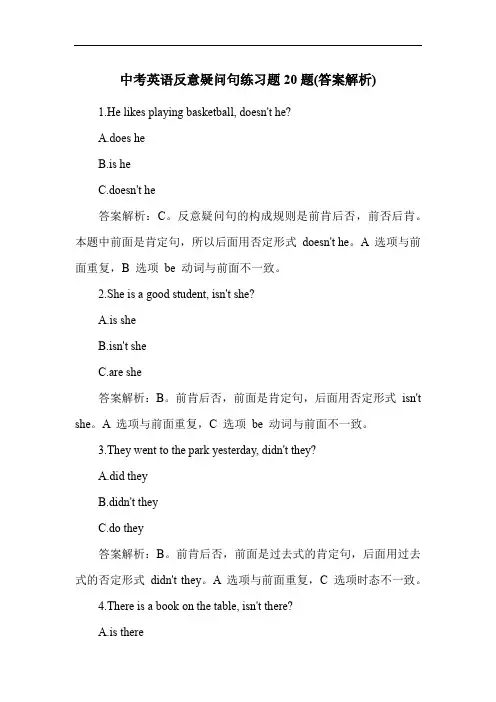
中考英语反意疑问句练习题20题(答案解析)1.He likes playing basketball, doesn't he?A.does heB.is heC.doesn't he答案解析:C。
反意疑问句的构成规则是前肯后否,前否后肯。
本题中前面是肯定句,所以后面用否定形式doesn't he。
A 选项与前面重复,B 选项be 动词与前面不一致。
2.She is a good student, isn't she?A.is sheB.isn't sheC.are she答案解析:B。
前肯后否,前面是肯定句,后面用否定形式isn't she。
A 选项与前面重复,C 选项be 动词与前面不一致。
3.They went to the park yesterday, didn't they?A.did theyB.didn't theyC.do they答案解析:B。
前肯后否,前面是过去式的肯定句,后面用过去式的否定形式didn't they。
A 选项与前面重复,C 选项时态不一致。
4.There is a book on the table, isn't there?A.is thereB.isn't thereC.are there答案解析:B。
前肯后否,前面是there be 句型的肯定句,后面用there be 句型的否定形式isn't there。
A 选项与前面重复,C 选项be 动词与前面不一致。
5.He can swim well, can't he?A.can heB.can't heC.does he答案解析:B。
前肯后否,前面是肯定句,后面用否定形式can't he。
A 选项与前面重复,C 选项助动词与前面不一致。
6.She has a pen, doesn't she?A.does sheB.doesn't sheC.has she答案解析:B。
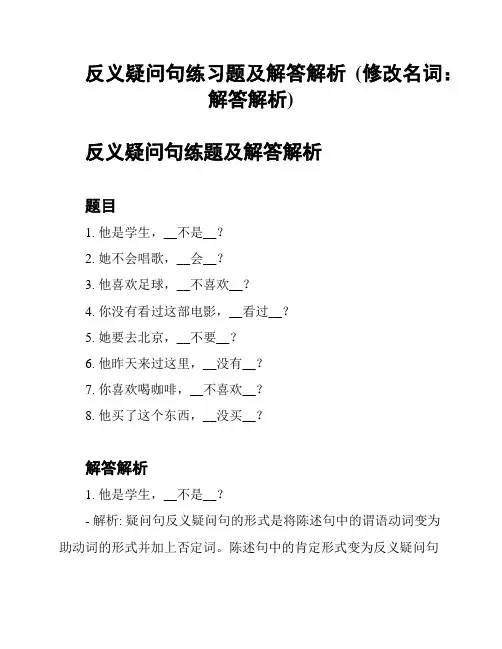
反义疑问句练习题及解答解析(修改名词:解答解析)反义疑问句练题及解答解析题目1. 他是学生,__不是__?2. 她不会唱歌,__会__?3. 他喜欢足球,__不喜欢__?4. 你没有看过这部电影,__看过__?5. 她要去北京,__不要__?6. 他昨天来过这里,__没有__?7. 你喜欢喝咖啡,__不喜欢__?8. 他买了这个东西,__没买__?解答解析1. 他是学生,__不是__?- 解析: 疑问句反义疑问句的形式是将陈述句中的谓语动词变为助动词的形式并加上否定词。
陈述句中的肯定形式变为反义疑问句的否定形式,陈述句中的否定形式变为反义疑问句的肯定形式。
因此,本题答案为"不是"。
2. 她不会唱歌,__会__?- 解析: 根据上述解析,本题答案为"会"。
3. 他喜欢足球,__不喜欢__?- 解析: 根据上述解析,本题答案为"不喜欢"。
4. 你没有看过这部电影,__看过__?- 解析: 根据上述解析,本题答案为"看过"。
5. 她要去北京,__不要__?- 解析: 根据上述解析,本题答案为"不要"。
6. 他昨天来过这里,__没有__?- 解析: 根据上述解析,本题答案为"没有"。
7. 你喜欢喝咖啡,__不喜欢__?- 解析: 根据上述解析,本题答案为"不喜欢"。
8. 他买了这个东西,__没买__?- 解析: 根据上述解析,本题答案为"没买"。
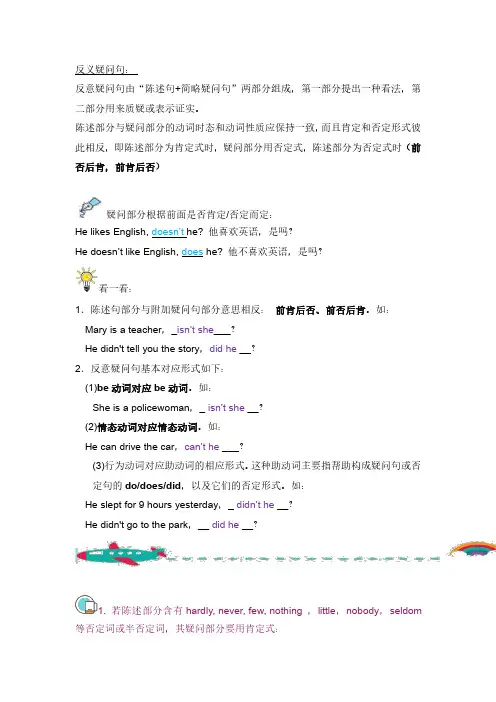
反义疑问句:反意疑问句由“陈述句+简略疑问句”两部分组成,第一部分提出一种看法,第二部分用来质疑或表示证实。
陈述部分与疑问部分的动词时态和动词性质应保持一致,而且肯定和否定形式彼此相反,即陈述部分为肯定式时,疑问部分用否定式,陈述部分为否定式时(前否后肯,前肯后否)疑问部分根据前面是否肯定/否定而定:He likes English,doesn’t he?他喜欢英语,是吗?He doesn’t like English,does he?他不喜欢英语,是吗?看一看:1.陈述句部分与附加疑问句部分意思相反:前肯后否、前否后肯。
如:Mary is a teacher,_isn’t she___?He didn't tell you the story,did he__?2.反意疑问句基本对应形式如下:(1)be动词对应be动词。
如:She is a policewoman,_isn’t she__?(2)情态动词对应情态动词。
如:He can drive the car,can’t he___?(3)行为动词对应助动词的相应形式。
这种助动词主要指帮助构成疑问句或否定句的do/does/did,以及它们的否定形式。
如:He slept for9hours yesterday,_didn’t he__?He didn't go to the park,__did he__?1.若陈述部分含有hardly,never,few,nothing,little,nobody,seldom 等否定词或半否定词,其疑问部分要用肯定式:He has few friends here,has he?他在这儿几乎没什么朋友,是吗?She said nothing,did she?她什么也没说,是不是?2.当陈述部分为为there be句型时,疑问部分仍用there作“主语”:例如:There was nothing in the room,was there?房间里什么也没有,是吗?3.当陈述部分的主语是复合不定代词时,若陈述部分的主语为somebody, someone,everyone,everybody,no one,nobody等复合不定代词,其反意疑问句的主语在正式文体中用he,在口语或非正式文体中通常用they例如:Nobody was late,were they?没有一个人迟到,是吗?4.当陈述部分的主语是something,anything,nothing,everything等复合不定代词时,其反意疑问句的主语要用it:例如:Everything is ready,isn’t it?一切都准备好了吗?5.当陈述部分是I’m…时,疑问部分通常用aren’t例如:I’m wrong,aren’t I?我错了,是吗?6.当陈述部分是I wish…时,疑问部分通常用may I例如:I wish to go with them,may I?我想同他们一起去,可以吗?认一认:几种特殊的反义疑问句1.基本原则:若陈述部分为祈使句,疑问部分通常用will you:Please help us,will you?请帮帮我们,好吗?Come with us,will you?同我们一起去,好吗?2.当祈使句为Let’s…时,疑问部分总是用shall weLet’s go there together,shall we?我们一起去,好吗?3.当祈使句为Let us…时,若表示请求,疑问部分用will you,若表示建议,疑问部分用shall we:Let us know your address,will you?请把你的地址告诉我们,好吗?Let us go swimming together,shall we?我们一起去游泳好吗?能力提升:完成下列反义疑问句1.He has a lot of work to do,___doesn’t______he___?2、Uncle Wang forgot to bring your bag,___didn’t______he___?3、There’re more than ten pandas on the hill,__isn’t___there__?4、Tom wants to get his TV set back,__doesn’t_____he___?5、It’s fine today,_isn’t___it__?6、Mary’s just come back from America,_hasn’t___she___?7、Danny bought some shampoo in the supermarket,___didn’t______he___?8、Nobody was looking for me,___was______he___?9、He needs our help,__doesn’t____he__?10.Let us stop to rest,__will_you_?。

高中英语反义疑问句练习题及讲解1. 练习题: She is a student, isn't she?讲解: 这个句子是一个肯定陈述句,后面跟了一个简短的否定疑问句。
在英语中,当陈述句是肯定的,反义疑问句通常使用否定形式。
2. 练习题: They can play the piano, can't they?讲解: 这里使用了情态动词 "can",反义疑问句中情态动词保持不变,主语变为复数 "they",疑问部分使用 "can't"。
3. 练习题: He never goes to the cinema, does he?讲解: "Never" 表示否定意义,所以即使主句是肯定形式,反义疑问句也要使用否定形式。
"goes" 是实义动词,所以疑问部分使用助动词 "does"。
4. 练习题: She is not at home, is she?讲解: 尽管有 "not" 这个词,但因为 "is not" 是一个否定形式的系动词,所以反义疑问句使用肯定形式 "is she"。
5. 练习题: Tom doesn't like apples, does he?讲解: "Doesn't" 是 "does not" 的缩写形式,表示否定。
反义疑问句中使用 "does" 来代替 "does not",并且主语 "Tom" 保持不变。
6. 练习题: Everyone is ready, aren't they?讲解: "Everyone" 作为不定代词,通常被视为单数,但反义疑问句中使用复数形式 "aren't"。
反义疑问句详解及练习题(带答案)反义疑问句的用法1.定义:反义疑问句,表示说话人提出看法、建议或意见,问对方同意与否。
2.结构:有两部分组成,前一部分为陈述形式,后一部分为疑问句。
3.形式:前肯后否与前否后肯。
XXX isn't beautiful, is she?露西不漂亮,是吗?Li Ming is pretty handsome, isn't he?XXX相当帅,不是吗?4.回答:肯定回答:“Yes+肯定结构”,否定回答“No+否定结构”,但是注意“Yes”要译为“不”,“No”要译为“是”。
-Your sister is a XXX, isn't she?你妹妹是老师,不是吗?-Yes, she is.不,她是老师。
-You can play the guitar, can't you?你会弹吉他,不是吗?-No, I can't.是的,我不会。
特别注意:1)当陈述部分为否定式,反意疑问句为肯定式时,其回答往往与汉语不一致"It isn’t cheap, is it?" "Yes, it is."“它不便宜吧?”“不,很便宜。
”"He doesn’t love her, does he?" "No, he doesn’t."“他不爱她,是吗?”“是的,他不爱她。
”此时,"Yes"即不,对前面"It XXX."的否定。
否认反意疑问句的回覆当陈述部分为肯定式,反意疑问句为否定式时,其回答一般不会造成困难,一般只需照情况回答即可:"It’s new, isn’t it?" "Yes, it is."“是新的,对吗?”“对,是新的。
”"He wants to go, doesn’t he?" "No, he doesn’t."“他想去,对吗?”“不,他不想去。
反义疑问句1 肯定陈述句+否定附加疑问e.g.1 ----He likes chocolates, doesn’t he ? 他喜欢巧克力, 难道不是吗?----Yes, he does.是,他喜欢. No, he doesn’t. 不,他不喜欢.2---They will be away for a time, won’t they? 他们将离开一段时间, 难道不是吗?--- Yes, they will.是, 他们将离开一段时间. No, they won’t. 不,他们不.2 否定陈述句+ 肯定附加疑问e.g. 1 ---It wasn’t cold yesterday, was it? 昨天不冷,是吗?---Yes, it was. 不,很冷。
/ No, it wasn’t. 对,不冷。
2 ---She can’t play the guitar, can she? 她不会弹吉他,是吗?--- Yes, she can. 不,她会。
/No, she can’t. 对,她不会。
3、遵循“前否后肯”或“前肯后否”的原则:4前后两句主语不相同 :主语不一致的若干情况如下(需牢记):1)This/that变It 如; This is your brother, isn’t it?2)These/those 变they 如Those are books, aren’t they?3)Something\anything\everything\nothing 变It如: Nothing is serious, is it?4)Everybody/everyone\Somebody/someone\Anybody/anyone\nobody\no one 变he\they如:Everyone knows this, don’t they? (Everyone knows this, doesn’t he?)5)I am变aren’t I如:I am your friend, aren’t I?6)句中有seldom, hardly, no, not, never, few, little, nothing, nobody, nowhere 等于是否定句,疑问部分必须采用肯定形式:Nobody phoned while I was out, did they?He is hardly able to swim, is he?There is little ink in your pen, is there?7)句中有等否定前缀或后缀un-, im-, dis-,构成的词语时,看作肯定,文句用否定.He dislikes the two subjects, doesn’t he?8)祈使句的反意疑问句Let me …,will you ?let us …,will you?Let him come in, will you?Let’s …,shall we?Let’s go for a walk, shall we?否定的祈使句Don’t +V…will you?Don’t make a noise, will you?表示邀请,请求的肯定祈使句will youCome here, will you?Turn off the light, will you?8)当前面主句是I\we think… I\We believe guess…时, 问句与宾语从句一致.I think she is right, isn’t she?We don’t believe you can pass the exam, can you反义疑问句练习题1.It’s very hot today, _______________ ?2. He can speak Chinese, _______________ ?3. Meimei studies in a middle school, _______________ ?4. He never gets up late , _______________ ?5. Don’t go out at night, _______________ ?6.He never loves cold weather , _______________ ?7. You finished the task yesterday, _______________ ?9.Tom has been to Singapore , _______________ ?10.The story is little interesting, _______________ ?11.Everything starts to grow in spring, _______________ ?12.He can hardly finish his homework, _______________ ?13.I’m in Class 3,Grade 2, _______________ ?14.Let’s go shopping , _______________ ?15.She doesn’t like climbing hills , _______________ ?16.I don’t think it is cold today, _______________ ?19.Few students can answer the question, _______________ ?20.Mike likes English, _______________ ?21.That was a wonderful night, _______________ ?22.Your sister helped him, _______________ ?23.Tom is skating, _______________ ?24.You aren’t a teacher, _______________ ?25.They haven’t been to the Great Wall, _______________ ?26.You will join the soccer team, _______________ ?28.There are some good books for you, _______________ ?29.They have been there twice, _______________ ?30.Let’s do it now, _______________ ?31.You dislike this kind of gifts, _______________ ?32.Nothing is impossible, _______________ ?34.He doesn’t go to school by bus, _______________ ?35.There is little milk left in the bottle, _______________ ?36.Let us clean the classroom by ourselves, _______________ ?37.He has studied here for about four years, _______________ ?38.You have never lost money before, _______________ ?40.Peter could hardly see the words on the blackboard, _______________ ?41.She’s American, _______________ ?42.There will be a volleyball match in our school, _______________ ?43.Don’t smoke in the reading-room, _______________ ?44.I don’t think he is right, _______________ ? .59.No one knows about it, _______________ ?。
四年级英语反义疑问句练习题30题(带答案)1. You are a student, aren't you?答案:Yes, I am.解析:反义疑问句由两部分组成,前一部分是一个陈述句,后一部分是一个简短的疑问句。
在这个句子中,前面陈述句是“你是一个学生”,后面的简短疑问句“aren't you”是对前面陈述的反问。
回答时,如果事实是肯定的,就用“Yes + 肯定形式”,这里我是学生,所以回答“Yes, I am”。
2. He likes playing football in the park, doesn't he?答案:Yes, he does.解析:前面陈述句说他喜欢在公园踢足球,后面简短疑问句“doesn't he”进行反问。
如果他确实喜欢,回答就是“Yes, he does”,这是因为在英语中,对于反义疑问句,肯定事实用“Yes + 主语+ 助动词(与前面一致)”的形式回答。
3. She is your sister, isn't she?答案:Yes, she is.解析:此句前面陈述她是你的姐妹,后面“isn't she”反问。
当她确实是姐妹时,按照反义疑问句的回答规则,肯定回答为“Yes, she is”。
4. They go to school by bus, don't they?答案:Yes, they do.解析:前面表明他们坐公交车去上学,后面“don't they”反问。
如果事实是他们确实坐公交上学,就要用“Yes, they do”回答,因为这是对肯定事实的回应。
5. Your mother cooks well, doesn't she?答案:Yes, she does.解析:前面说你妈妈做饭做得好,后面“doesn't she”反问。
如果妈妈做饭确实好,就回答“Yes, she does”,这遵循了反义疑问句肯定事实肯定回答的原则。
反意疑问句在陈述句之后,附加一个简短问句,对陈述部分所述事实或观点提出疑问,叫反意疑问句。
附加问句的谓语动词及主语的形式均须与陈述部分保持一致,且主语必须用人称代词。
反意疑问句须遵循“前肯后否、前否后肯”的原则。
在中考题中,反意疑问句主要考查不同情况下专项练习:1. Tell me how to solve this problem, ____?A. do youB. don't youC. will youD. shan't you2. Half an hour ought to be enough time, ____?A. shouldn't itB. didn't theyC. oughtn't half an hourD. shouldn't half an hour3. They have to go to school now, ____?A. haven't theyB. don't theyC. hadn't theyD. did they4. When the car crashed, your brother escaped being hurt, ____?A. did itB. didn't itC. didn't heD. did he5. I'm dirty, ____?A. am IB. isn't IC. aren't ID. am not I6. That's the sort of the book you want, ____?A. is thatB. isn't itC. is itD. isn't that7. I suppose you're not leaving, ____?A. are youB. don't youC. do youD. aren't you8. I wish to shake hands with you, ____?A shall I B. may IC. do ID. will I9. AIl these dictionaries are a great help to you, ____?A. aren't all theseB. are all these dictionariesC. aren't theyD. are they dictionaries10. The film that we saw last week was quite amazing, ____?A. was itB. wasn't itC. weren't weD. didn't we11. He has been writing letters all afternoon, but he should have finished them by now, ____?A. shouldn't heB. didn't youC. hasn't heD. has he12. We'd rather stay at home tonight, ____?A. isn't itB. hadn't weC. wouldn't weD. won't we13. There appeared to be no better way, ____?A. didn't thereB. were thereC. did thereD. was there14. You had some trouble finding where I live, ____?A. do IB. hadn't youC. didn't youD. don't I15. He has his hair cut every month, ____?A. has heB. hasn't heC. does heD. doesn't he16. Jim told me that he would take a trip to Britain, ____?A. would heB. wouldn't heC. did heD. didn't he17. Jimmy dare not go to church, ____?A. does heB. dare heC. daren't heD. doesn't he18. She would have worked abroad if she'd had the chance, ____?A. wouldn't sheB. would sheC. hadn't sheD. has she19. Everyone is enjoying themselves, ____?A. aren't theyB. isn't everyoneC. does heD. is he20. Anyone can have a meal here, ____?A. can theyB. can't anyoneC. can't theyD. can anyone21. Your friend needs to come earlier, ____?A. need heB. needn't heC. does heD. doesn't he22. Jenny scarcely comes to visit you, ____?A. does sheB. doesn't sheC. do youD. don't you23. Let's listen to the radio program that the teacher mentioned, ____?A. don't weB. do weC. shall weD. shan't we24. The teacher had a talk with you, ____?A. has youB. hadn't sheC. did sheD. didn't she25. You think you're funny, ____?A. do youB. are youC. don't youD. didn't you26. Janet used to take part in labor in that village, ____?A. used sheB. did sheC. didn't sheD. should she27. What a beautiful flower, ____?A. doesn't itB. isn't itC. won't itD. is it28. No one will believe how difficult his work has been, ____?A. will heB. won't nobodyC. will theyD. won't they29. You must have made the mistake, ____?A. mustn't youB. haven't youC. didn't youD. hadn't you30. Learning how to repair computers takes a long time, ____?A. isn't itB. aren't theyC. doesn't itD. don't they31. Tom has milk with breakfast, ____?A. hasn't TomB. hasn't heC. doesn't TomD. doesn't he32. They must have stayed at hotel last night, ____?A. mustn't theyB. haven't theyC. didn't theyD. hadn't they33. Something'll have to be done about the air pollution, ____?A. won't itB. will itC. has itD. does it34. You must be hungry, ____?A. must youB. mustn't youC. are youD. aren't you35. She had the clothes cleaned, ____?A. had sheB. hadn't sheC. didn't sheD. didn't her daughter36. There isn't anything wrong with the car, ____?A. is thereB. is itC. does itD. does there答案:1-5 CABCC 6-10 BABCB 11-15 ACCBD 16-20 DBAAC 21-25 DACDC 26-30 CBABC 31-36 DCADCA。
反义疑问句练习1.Zhou Ming has few English magazines, ________?A.does heB.doesn ’t heC.has heD.hasn ’t he2.Cindy could hardly speak English three years ago, ________?A. couldn't she?B. could sheC. can she3.Alice had a wonderful time yesterday, _______?A. hadn ’ t sheB. wasn ’ t sheC. didn’ t sheD. wouldn’ t she 4.–She didn ’t come to schoolyesterday, did she?–______, though she was not feeling well.A. No, she didn’ tB. Yes, she didn’tC. No, she didD. Yes, she did5.---He hardly spent any time on his subjects, ________?---________, so he does badly in his lessons.A .didn’ t he, YesB. did he, Yes C. didn’ t he, NoD. did he, No 6.He’s read this book before,?A. hasn ’ t heB. doesn ’ t heC. isn’ t heD. wasn’ het 7.–Let ’s go for a walk, ______?-- OK, I ’m coming . Don’t forget to bring your camera, ______?A. will you; will youB. will you; shall weC. shall we; shall weD. shall we; will you8.John had a short walk after lunch,?A. did heB. didn't heC. had heD. hadn't he9. Nancy hardly rings you up, ___________?A. doesn ’ t sheB. does sheC. doesn ’ t NancyD. does Nancy10.---Your brother often disagrees with you, _______ he ?--- _______. We often have different opinions.A.does; YesB. doesn ’ t ;YesC. does; NoD. doesn ’ t; No 11.Kate ’s neverlate for school,?A.isn ’ t sheB.hasn ’ theC.is sheD.has she12.--- Liu Tao has never read the book The Adventure of Tom Sawyer , _______ he?--- _____. He told me it's very interesting. He'd like to read it again.A. is; No, he isn'tB. has; Yes, he hasC. isn’ t; Yes, he isD. hasn ’ t; No, he hasn't13.—He’s never late for school, ________?— No, he isn ’ t .He is alwaysvery early.A. is heB. isn’ t heC. hasn ’ t heD. has he14.—There ’s little meat left in the fridge, ________?— ________. I ’ ll get some on my way home.A. is there, YesB. isn’t there, YesC. is there, NoD. isn’t there, No15.—Tom finished his homework, didn’t he?— __________, though he was ill yesterday.A. No, he didn’tB.Yes, he didC. Yes, he doesD. No, he doesn’t16.There is little water in the cup,?A. is thereB. isn’ t thereC. isn’ t itD. is it17. He’s stillnot understood by his close friend although he has said sorryto him, _________?A. hasn ’ t heB. has heC. isn’ t heD. is he18. You have never visited the place before,you?A. didB. didn’tC. haveD. haven ’t19. Don't keep poison in the kitchen, _______?A. do youB. shall weC. will youD. don't you20. There are no museums in our city, _________?A. aren’ t thereB.are thereC. is thereD. isn’t there21.Your father is playing the piano very well,he?A.isB.isn ’ tC.doesD.doesn ’t22.— It ’s her birthday tomorrow, ______ ?— Yes, let ’ s have a surprise party for her.A. isn’ tBit. isn’t sheC. doesn ’ t itD. doesn ’ t she23.--- He’s never stolen anything before, _______ he?---________. It ’is sthird time to be taken to the police station.A. hasn ’ t; YesB. has; NoC. has; YesD. is; No24.— It ’s her birthday tomorrow, ______ ?— Yes, let ’ s have a surprise party for her.A. isn’ tBit. isn’t sheC. doesn ’ t itD. doesn ’ t she25.-----Your father never watched the drama series on TV, __________? -----_____________________. He thinks theses drama series are boring and dull.A.does he; Yes, he does.B. does he; No, he doesn’tC. doesn ’ t he ; Yes, he does.D. doesn ’ t he ; No, he doesn’ t .26.—Tom is an honest boy, _______ he?—Yes. We trust him all the time.A. isn’tB. isC. doesD. doesn ’t27.Good, you ’ve done it well! You need no more help from us, ______.?A. do youB. need youC. don ’ t youD. needn ’ t you28.His father had an important meeting just now, _______?A. did heB. had heC. didn't heD. hadn't he29. -- You used to be short, didn’t you?-- _______. I was the shortest in my class.A. Yes, I did.B. No, I didn’t.C. Yes, I was.D. No, I wasn’t.30.The farmer is working now. He’s fed the horse and the sheep, _____?A. doesn ’ t heB. isn’ t heC. wasn ’ t heD. hasn ’ t he参照答案1.A【分析】试题剖析:句意为:周明几乎没有英语杂志对吗?这是一个反义疑问句,反义疑问句的构造按照前一定后否认或许前否认后一定,前后代称、时态一致的原则。
知识梳理句型解释1.陈述部分肯定式+疑问部分否定式可记为前肯后否2.陈述部分否定式+疑问部分肯定式可记为前否后肯主语一般词语附加疑问句中主语用和主语一致的主语,用主格;不定代词当陈述部分的主语是1 用one 时,后面的疑问句可用one/he.2everything,anything,nothing,something时, 附加疑问句中主语用it 不用 they3this,that,或those,these时,附加疑问句中主语用it和they.4everyone,everybody,someone,somebody等,附加疑问句中主语一般用he/they.5不定式,动名词,其他短语,附加疑问句中主语一般用it;6在there be句型中,附加疑问句中主语一般用be/情态动词/助动词+there;特殊句型否定意义的词否定意义的词1当陈述部分有never,seldom, hardly,few,little,barely, scarcely, nothing 等否定意义的词时,后面的反意疑问句则为肯定形式:There are few apples in the basket, are thereHe can hardly swim, can heThey seldom come late, do they2当陈述部分含有否定意思的词是unhappy,dislike,unfriendly等含有否定词缀的派生词,也就是有un-前缀、-less后缀等含有词缀而意思否定的词,当做肯定句处理,疑问部分要用否定形式;如:He looks unhappy,doesn't he他看上去不高兴,不是吗The girl dislikes history,doesn't she这女孩不喜欢历史,不是吗有less,fewer 等词视为肯定词,疑问部分用否定形式;如:There will be less pollution, won't there 表示主语主观意愿的词含有think, believe, suppose, imagine, expect等动词后接宾语从句构成的主从复合句在构成反意疑问句时,视情况不同有两种不同的构成方式;1.当主句的主语为第一人称时,其后的简短问句应与从句相一致;例如:I expect our English teacher will be back this weekend, won't she/heWe suppose you have finished the project, haven't you值得注意的是,当这些动词后接的宾语从句的否定转移到主句时,其仍属否定句,故其后的简短问句应用肯定式,而非否定式;例如:I don't believe that he can translate this book, can heWe don't imagine the twins have arrived, have they此类句子的回答同"前否后肯"型反意疑问句一样,如上述后一个句子,若双胞胎已经到了,则回答为"Yes, they have.";若尚未到达,使用"No, they haven't.";2.当主句的主语为第二、三人称时,其后的简短问句则应与主句相一致此时,否定只看主句,与从句无关...;例如:Your sister supposes she needs no help, doesn't sheYou thought they could have completed the project, didn't youThey don't believe she's an engineer, do theyShe doesn't expect that we are coming so soon, does she3但如果主句的时态是过去时等等,疑问句应和主句的人称时态保持一致;had better或have陈述部分有had better,或其中的have表示完成时态时,疑问句应用hadn’t等开头:You’d better get up early, hadn’t you其他情况句中有have时疑问句应用don't等开头如have表示“有”的时候,有两种形式:-He has two sisters,doesn't he-He doesn't have any sisters,doe she祈使句当陈述部分是祈使句时,疑问句要根据语气来表达当开头是Let‘s时,一定要用shall we;其余都用will you包括 Let us不论肯定否定Let’s go out for a walk, shall weLet us go out for a walk, will youLet me help you,may ITurn on the radio, will youThere be句型There be 句型中,反义疑问部分必须为be 动词 + thereThere are some apples in the basket, aren't thereThere isn't any milk left, is theremust.当陈述部分有情态动词must,问句有4种情况:1mustn't表示“禁止,不可,不必”时,附加问句通常要用must.You mustn't stop your car here,must you 你不能把车停在这地方,知道吗2must表示“有必要”时,附加问句通常要用needn't.They must finish the work today,needn't they 他们今天要完成这项工作,是吗3当must用来表示对现在的情况进行推测时,问句通常要根据must后面的动词采用相应的形式; He must be good at English,isn't he 他英语一定学得很好,是吗4当must+have done表示对过去的情况进行推测一般句中有明确的过去时间状语,问句要根据陈述部分谓语的情况用“didn't+主语”或“wasn't/weren't+主语”;如果强调动作的完成一般没有明确的过去时间状语,问句要用“haven't/hasn't+主语”;She must have read the novel last week,didn't she 她上星期一定读了这本小说,是吗You must have told her about it,haven't you 你一定把这事告诉她了,是吗回答反意疑问句的回答用yes, no, 但是,回答意思相反,当陈述部分是否定形式时,回答要按事实;如:They don’t work hard, do they 他们不太努力工作,是吗Yes, they do. 不,他们工作努力;/No, they don’t. 对, 他们工作不努力肯定反意疑问句的回答当陈述部分为否定式,反意疑问句为肯定式时,其回答往往与汉语不一致,需特别引起注意:"It isn’t cheap, is it" "Yes, it is." “它不便宜吧”“不,很便宜;”"He doesn’t love her, does he" "No, he doesn’t."“他不爱她,是吗”“是的,他不爱她;”此时,"Yes"即不,对前面"It isn't cheap."的否定;否定反意疑问句的回答当陈述部分为肯定式,反意疑问句为否定式时,其回答一般不会造成困难,一般只需照情况回答即可:"It’s new, isn’t it" "Yes, it is." “是新的,对吗”“对,是新的;”"He wants to go, doesn’t he" "No, he doesn’t." “他想去,对吗”“不,他不想去;”此时,"Yes"即是,对前面"It's new."的肯定;回答反意疑问句的原则回答反意疑问句通常应根据实际情况来确定,如有人问你You are asleep, aren’t you 你应回答No, I’m not. 因为既然你能回答,肯定你还没有asleep;但如果别人问你 You aren’t asleep, are you你还没有睡着,对吗,你也只能回答No, I’m not.是的,还没有睡着,而不能回答为Yes, I’m not. 也不能回答成 Yes, I am.“It is a beautiful flower,isn't it”“It isn't a beautiful flower,is it”上述两句句子的回答肯定均为“Yes,it is."否定为“No,it isn't."由上述例子可知,反义疑问句回答与句子本身所包含的中文肯定与否的含义并无太大关联,只需注意事实,肯定即用yes,否定用no,无需考虑句子原本是前否后肯或是前肯后否;反义疑问句练习典题精析1. Linda ate nothing this morning, ___A. didn’t sheB. was sheC. did sheD. wasn’t she2. There’s hardly___ milk in the bottle, _____thereA. no, isn’tB. some, isC. little, isn’tD. any, is3. He has never ridden a horse before, ___A. does heB. has heC. hasn’t heD. doesn’t he4. — He seldom came here, _____— Yes sir.A. didn’t heB. does heC. doesn’t heD. did he5. Everything seems all right, _____A. does itB. don’t theyC. won’t itD. doesn’t it6. One can’t be too modest, can _____A. oneB. heC. itD. we7. No one failed in the exam, _____A. was heB. did oneC. did theyD. didn’t he8. Neither you nor I am an artist, _____ A. am I B. aren’t we C. are we D. ain’t I9. He can’t be her father, _____ heA. isB. isn’tC. canD. can’t10. They have no time to visit the museum, _____A. do theyB. haven’t theyC. don’t theyD. will they11. You’d better go at once, _____ youA. hadn’tB. didC. didn’tD. don’t12. You’d rather work than play, _____ youA. hadn’tB. wouldn’tC. didn’tD. mustn’t13. You dare not do that, _____ youA. don’tB. doC. dareD. daren’t14. He dislikes the two subjects, _____ heA. doesB. doesn’tC. isD. isn’t15. These tools are useless now, _____A. are theyB. aren’t theyC. is itD. isn’t it16. He used to get up at 6:30, _____ he A. didn’t he B. did he C. used he D. wouldn’t he17. He ought to win the first prize, _______ heA. mustn’tB. oughtn’tC. shouldn’tD. Both B and C.18. Let’s go there by bus, ___A. will youB. shall weC. don’t youD. will you19. Let us go to play football, ___A. will youB. shall weC. do weD. are we20. Don’t forget to give Polly some food and change her water, ___A. will youB. shall weC. won’t youD. do you21. —Let’s go shopping this afternoon, _____— All right.A. will weB. shall weC. don’t weD. are we22. — Pass me the dictionary, _____— Yes, with pleasure.A. would youB. will youC. won’t youD. wouldn’t you23. There is little water in the glass, ____ A. isn’t there B. isn’t it C. is it D. is there24. There won’t be any concert this Saturday evening, _____A. will there notB. will thereC. is thereD. won’t25. — I guess she taught herself Japanese, ______— Yes.A. don’t IB. did sheC. do ID. didn’t she26. I don’t believe you are right, _____A. are youB. do youC. won’t youD. do27. She doesn’t think that Tom sings best in the class, _____A. does sheB. doesn’t sheC. does heD. doesn’t he28. I know you didn’t want to hurt me, _____A. did youB. didn’t youC. do ID. don’t I29. If my father were here he would be very happy, _____ A. weren’t he B. were he C. wouldn’t he D. would he能力提升1. It’s the third time that John has been late, ____A. hasn’t heB. isn’t heC. isn’t itD. hasn’t it2. Let’s take a rest, ___________.A. will weB. shall weC. shan’t weD. won’t we3. Let us pass, _________ A. shan’t we B. shall we C. won’t we D. will you4. Wait a minute, __________A. shall youB. will youC. do youD. don’t you5. The suit’s finished, __________ A. doesn’t it B. isn’t it C. haven’t you D. hasn’t it6. He’s posted the letter, _________he A. isn’t B. doesn’t C. hasn’t D. wasn’t7. They’d go with us, __________A. wouldn’t theyB. didn’t theyC. hadn’t theyD. couldn’t they8. What fresh air, ________ A. is it B. does it C. isn’t itD. doesn’t it9. The Emperor’s clothes became the talk of the whole city, _________A. did itB. didn’t itC. did theyD. didn’t they10.Mr. And Mrs. Turner work in this hospital, ________A. are theyB. aren’t theyC. do theyD. don’t they11. She has breakfast at six every day, ________A. has sheB. hasn’t sheC. does sheD. doesn’t she12. Nothing seems to please her, _________ A. does it B. doesn’t it C.is it D. isn’t it13. She never tells a lie, ________ A. does she B. doesn’t she C. is itD. isn’t it14. You hardly know each other, _________A. do youB. don’t youC. have youD. didn’t you15. The man in blue must be your brother, _____A. mustn’t heB. needn’t heC. isn’t heD. is he16. I don’t think he will come to our party, _____A. will heB. won’t heC. does heD. do I17. I suppos e he’s serious, ___________A. do IB. don’t IC. is heD. isn’t he18. Wang said that he was not there then, _____A. did heB. didn’t heC. was heD. wasn’t he19. You daren’t say that to him, _________A. dare youB. do youC. daren’t youD. don’t you20. You must have read about Dickens long ago, __________A. mustn’t youB. haven’t youC. can’t youD. didn’t you随堂小测三智题库QYF21. You’d better not smoke here, ________A. will youB. shall youC. have youD. had you22.There isn’t going to be a volleyball match next week, __________23. A. is it B. isn’t it C. is there D. isn’t there23. There used to be a church behind the cemetery, _____________A. didn’t thereB. used thereC. usedn’t itD. didn’t it24. What a lovely day, _________ A. doesn’t it B. hasn’t it C.won’t D. isn’t it25. You must have been there, ____________A. have youB. did youC. haven’t youD. didn’t you26. That is your school, ___________A. isn’t thatB. mustn’t itC. isn’t itD. won’t it27. She dislikes this skirt, _________________A. doesn’t sheB. does sheC. isn’t sheD. is she28. No one can stop us from going there, ______A. can’t itB. can theyC. can’t theyD. can one师生互动分数评语错题归档确认答案典题精析. 1-5 CDBDD 6-10 ACCAA 11-15 ABCBB 16-20 ADBAA 21-25 BBDBD 26-29 AAAC 能力提升. 1-5 CBDBB 6-10 CACDD 11-15 DAAAC 16-20 ADBAD随堂小测21-25 DCADC 26-28CAB。
反义疑问句练习1.Zhou Ming has few English magazines, ________?A.does heB.doesn’t heC.has heD.hasn’t he2.Cindy could hardly speak English three years ago, ________?A. couldn't she?B. could sheC. can she3.Alice had a wonderful time yesterday, _______?A. hadn’t sheB. wasn’t sheC. didn’t sheD. wouldn’t she 4.–She didn’t come to schoolyesterday, did she?–______, though she was not feeling well.A. No, she didn’tB. Yes, she didn’tC. No, she didD. Yes, she did5.---He hardly spent any time on his subjects, ________?---________, so he does badly in his lessons.A .didn’t he, Yes B. did he, Yes C. didn’t he, No D. did he, No 6.He’s read this book before, ?A. hasn’t heB. doesn’t heC. isn’t heD. wasn’t he 7.–Let’s go for a walk, ______?-- OK, I’m coming . Don’t forget to bring your camera, ______? A. will you; will you B. will you; shall weC. shall we; shall weD. shall we; will you8.John had a short walk after lunch, ________?A. did heB. didn't heC. had heD. hadn't he9.Nancy hardly rings you up, ___________?A. doesn’t sheB. does sheC. doesn’t NancyD. does Nancy 10.---Your brother often disagrees with you, _______ he ?--- _______. We often have different opinions.A.does; YesB. doesn’t ;YesC. does; NoD. doesn’t; No 11.Kate’s never late for school,?A.isn’t sheB.hasn’theC.is sheD.has she12.--- Liu Tao has never read the book The Adventure of Tom Sawyer , _______ he?--- _____. He told me it's very interesting. He'd like to read it again.A. is; No, he isn'tB. has; Yes, he hasC. isn’t; Yes, he isD. hasn’t; No, he hasn't13.—He’s never late for school, ________?—No, he isn’t .He is always very early.A. is heB. isn’t heC. hasn’t heD. has he 14.—There’s little meat left in the fridge, ________?—________. I’ll get some on my way home.A. is there, YesB. isn’t there, YesC. is there, NoD. isn’t there, No15.—Tom finished his homework, didn’t he?—__________, though he was ill yesterday.A. No, he didn’tB. Yes, he didC. Yes, he doesD. No, he doesn’t16.There is little water in the cup, ?A. is thereB. isn’t thereC. isn’t itD. is it17. He’s still not understood by his close friend although he has said sorryto him, _________?A. hasn’t heB. has heC. isn’t heD. is he18.You have never visited the place before, you?A. didB. didn’tC. haveD. haven’t19.Don't keep poison in the kitchen, _______?A. do youB. shall weC. will youD. don't you20.There are no museums in our city, _________?A. aren’t thereB. are thereC. is thereD. isn’t there21.Your father is playing the piano very well, he?A.isB.isn’tC.doesD.doesn’t22.—It’s her birthday tomorrow, ______ ?—Yes, let’s have a surprise party for her.A. isn’t itB. isn’t sheC. doesn’t itD. doesn’t she23.--- He’s never stolen anything before, _______ he?--- ________. It’s h is third time to be taken to the police station.A. hasn’t; YesB. has; NoC. has; YesD. is; No24.—It’s her birthday tomorrow, ______ ?—Yes, let’s have a surprise party for her.A. isn’t itB. isn’t sheC. doesn’t itD. doesn’t she25.-----Your father never watched the drama series on TV, __________? -----_____________________. He thinks theses drama series are boring and dull.A.does he; Yes, he does.B. does he; No, he doesn’tC. doesn’t he ; Yes, he does.D. doesn’t he ; No, he doesn’t .26.—Tom is an honest boy, _______ he?—Yes. We trust him all the time.A. isn’tB. isC. doesD. doesn’t27.Good, you’ve done it well! You need no more help from us, ______.?A. do youB. need youC. don’t youD. needn’t you28.His father had an important meeting just now, _______?A. did heB. had heC. didn't heD. hadn't he29.-- You used to be short, didn’t you?-- _______. I was the shortest in my class.A. Yes, I did.B. No, I didn’t.C. Yes, I was.D. No, I wasn’t.参考答案1.A【解析】试题分析:句意为:周明几乎没有英语杂志对吗?这是一个反义疑问句,反义疑问句的结构遵循前肯定后否定或者前否定后肯定,前后人称、时态一致的原则。
结合语境可知,few有否定意义,故应选A。
考点:考查反义疑问句。
2.B【解析】试题分析:hardly意为“几乎不”,是一个否定意义的副词,反意疑问句要遵循“前肯后否,前否后肯”的原则,句意:Cindy三年前几乎不能讲英语,不是吗?故选B。
考点:考查反意疑问句的用法。
3.C【解析】试题分析:句意:爱丽丝昨天过得很愉快,对吗?所以选C。
考点:考查反意疑问句。
【答案】D【解析】试题分析: 句意:昨天她没有来学校是吗?不,尽管她感觉不舒服,但是她还是来了。
此题考查反意疑问句,根据句意,故选D。
考点:考查反意疑问句的答语。
5.D【解析】试题分析:句意:他几乎不在功课上花费时间,是吗?是,所以他功课很差。
前面有hardly表否定,所以反义疑问句用肯定的,排除A、C,根据后面的答句说他课程学得很差,表示他几乎不学习,所以选No,表示不学习的意思。
考点: 考查反意疑问句。
6.A【解析】试题分析:句意:以前他已经读过这本书了,不是吗?因为前面的缩写代表的是has,反意疑问句,前肯定,后否定,选A。
考点:考查反意疑问句.7.D【解析】试题分析:句意:咱们去散散步,好吗?好吧,我就来。
别忘了带上你的相机,好吗?反意疑问句是英语四大问句之一,它是由一个陈述句加上一个短问句而构成的。
反意疑问句的基本构成形式是:陈述句+动词(肯定或否定)+主语?使用反意疑问句要注意以下若干对应规则:反意疑问句中问句部分的动词与陈述部分的动词在语气上成相反的对应关系,即:肯定+否定?否定+肯定?反意疑问句中问句部分的动词与陈述部分的动词种类要对应一致。